21世纪大学英语读写教程4第六单元课文中英对照
二十一世纪大学英语读写教程第四册课文翻译
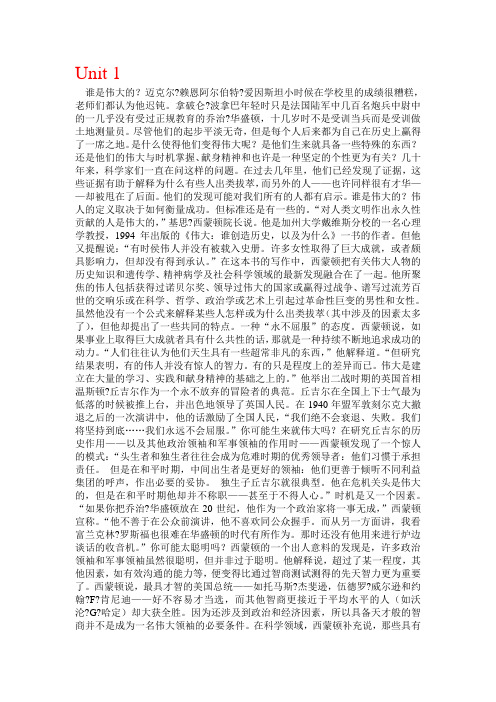
Unit 1谁是伟大的?迈克尔?赖恩阿尔伯特?爱因斯坦小时候在学校里的成绩很糟糕,老师们都认为他迟钝。
拿破仑?波拿巴年轻时只是法国陆军中几百名炮兵中尉中的一几乎没有受过正规教育的乔治?华盛顿,十几岁时不是受训当兵而是受训做土地测量员。
尽管他们的起步平淡无奇,但是每个人后来都为自己在历史上赢得了一席之地。
是什么使得他们变得伟大呢?是他们生来就具备一些特殊的东西?还是他们的伟大与时机掌握、献身精神和也许是一种坚定的个性更为有关?几十年来,科学家们一直在问这样的问题。
在过去几年里,他们已经发现了证据,这些证据有助于解释为什么有些人出类拔萃,而另外的人——也许同样很有才华——却被甩在了后面。
他们的发现可能对我们所有的人都有启示。
谁是伟大的?伟人的定义取决于如何衡量成功。
但标准还是有一些的。
“对人类文明作出永久性贡献的人是伟大的,”基思?西蒙顿院长说。
他是加州大学戴维斯分校的一名心理学教授,1994年出版的《伟大:谁创造历史,以及为什么》一书的作者。
但他又提醒说:“有时侯伟人并没有被载入史册。
许多女性取得了巨大成就,或者颇具影响力,但却没有得到承认。
”在这本书的写作中,西蒙顿把有关伟大人物的历史知识和遗传学、精神病学及社会科学领域的最新发现融合在了一起。
他所聚焦的伟人包括获得过诺贝尔奖、领导过伟大的国家或赢得过战争、谱写过流芳百世的交响乐或在科学、哲学、政治学或艺术上引起过革命性巨变的男性和女性。
虽然他没有一个公式来解释某些人怎样或为什么出类拔萃(其中涉及的因素太多了),但他却提出了一些共同的特点。
一种“永不屈服”的态度。
西蒙顿说,如果事业上取得巨大成就者具有什么共性的话,那就是一种持续不断地追求成功的动力。
“人们往往认为他们天生具有一些超常非凡的东西,”他解释道。
“但研究结果表明,有的伟人并没有惊人的智力。
有的只是程度上的差异而已。
伟大是建立在大量的学习、实践和献身精神的基础之上的。
”他举出二战时期的英国首相温斯顿?丘吉尔作为一个永不放弃的冒险者的典范。
21世纪大学英语(第四册)课后答案及课文翻译
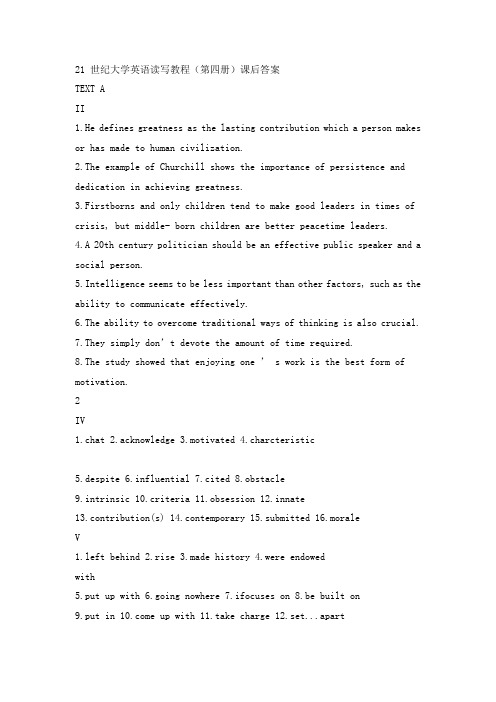
21 世纪大学英语读写教程(第四册)课后答案TEXT AII1.He defines greatness as the lasting contribution which a person makes or has made to human civilization.2.The example of Churchill shows the importance of persistence and dedication in achieving greatness.3.Firstborns and only children tend to make good leaders in times of crisis, but middle- born children are better peacetime leaders.4.A 20th century politician should be an effective public speaker and a social person.5.Intelligence seems to be less important than other factors, such as the ability to communicate effectively.6.The ability to overcome traditional ways of thinking is also crucial.7.They simply don’t devote the amount of time required.8.The study showed that enjoying one ’ s work is the best form of motivation.2IV1.chat2.acknowledge3.motivated4.charcteristic5.despite6.influential7.cited8.obstacle9.intrinsic 10.criteria 11.obsession 12.innate13.contribution(s) 14.contemporary 15.submitted 16.moraleV1.left behind2.rise3.made history4.were endowedwith5.put up with6.going nowhere7.ifocuses on8.be built on9.put in e up with 11.take charge 12.set...apartVIefficiency emergency fluency frequencyproficiency tendency urgency sufficiency1.fluency2.proficiency3.emergency4.Efficiency5.tendency6.frequency3VII1.For some students, it's not that they don't put in enough time — it's that they don't have good study habits.2.Children perform differently at school. It's not that they have differentIQs — it's that they are brought up in different environments.3.The company is not very productive. It's not that its staff aren't talented — it's that their energy hasn't been channeled effectively.4.I'm really sorry. It's not that I don't want to go to the cinema with you— it's that I have to finish my paper tonight.5.You have a stomachache. It's not that the food was bad — it's probably that you have too much stress from your work.VIII1.President Wilson didn't try to bring the US back to economic and political isolation. Instead, he believed in international cooperation through an association of nations.puters don't teach students in groups. Instead, they can help them learn effectively according to their 4different needs.3.We shouldn't focus on minor points. Instead, we should try to solve the problem of the greatest urgency at present.4.He dosen't get anybody else to help him. Instead, he likes to attend toeverything himself.5.Teaching success shouldn't be measured by the scores the students receive on tests. Instead, it should be measured by whether the studentshave internalized the ability and desire to learn.IXBCBAD DCABA DABCAX西蒙顿说,如果事业上取得巨大成就者具有什么共性的话,那就是一种持续不断地追求成功的动力。
2020年整理21世纪大学英语读写教程(第四册)课后句子翻译.doc
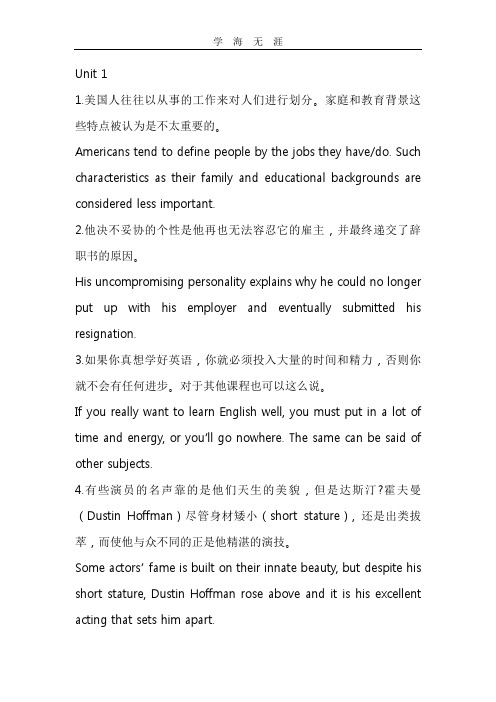
Unit 11.美国人往往以从事的工作来对人们进行划分。
家庭和教育背景这些特点被认为是不太重要的。
Americans tend to define people by the jobs they have/do. Such characteristics as their family and educational backgrounds are considered less important.2.他决不妥协的个性是他再也无法容忍它的雇主,并最终递交了辞职书的原因。
His uncompromising personality explains why he could no longer put up with his employer and eventually submitted his resignation.3.如果你真想学好英语,你就必须投入大量的时间和精力,否则你就不会有任何进步。
对于其他课程也可以这么说。
If you really want to learn English well, you must put in a lot of time and energy, or you’ll go nowhere. The same can be said of other subjects.4.有些演员的名声靠的是他们天生的美貌,但是达斯汀?霍夫曼(Dustin Hoffman)尽管身材矮小(short stature), 还是出类拔萃,而使他与众不同的正是他精湛的演技。
Some actors’fame is built on their innate beauty, but despite his short stature, Dustin Hoffman rose above and it is his excellent acting that sets him apart.5.他负责管理之后,我们发现他与前任(predecessor)有明显的不同:他有干劲和激情,想出了很多新点子,并把工作重点放在如何鼓舞我们的士气上。
新21世纪大学英语综合教程4 Unit6 back down to earth翻译
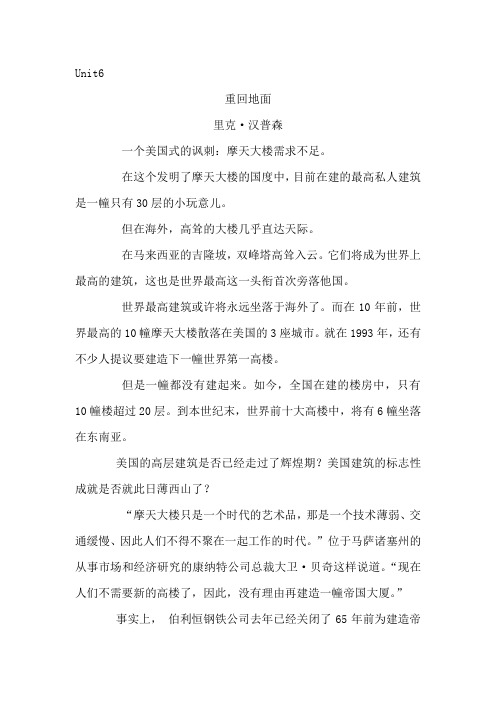
Unit6重回地面里克·汉普森一个美国式的讽刺:摩天大楼需求不足。
在这个发明了摩天大楼的国度中,目前在建的最高私人建筑是一幢只有30层的小玩意儿。
但在海外,高耸的大楼几乎直达天际。
在马来西亚的吉隆坡,双峰塔高耸入云。
它们将成为世界上最高的建筑,这也是世界最高这一头衔首次旁落他国。
世界最高建筑或许将永远坐落于海外了。
而在10年前,世界最高的10幢摩天大楼散落在美国的3座城市。
就在1993年,还有不少人提议要建造下一幢世界第一高楼。
但是一幢都没有建起来。
如今,全国在建的楼房中,只有10幢楼超过20层。
到本世纪末,世界前十大高楼中,将有6幢坐落在东南亚。
美国的高层建筑是否已经走过了辉煌期?美国建筑的标志性成就是否就此日薄西山了?“摩天大楼只是一个时代的艺术品,那是一个技术薄弱、交通缓慢、因此人们不得不聚在一起工作的时代。
”位于马萨诸塞州的从事市场和经济研究的康纳特公司总裁大卫·贝奇这样说道。
“现在人们不需要新的高楼了,因此,没有理由再建造一幢帝国大厦。
”事实上,伯利恒钢铁公司去年已经关闭了65年前为建造帝国大厦提供钢材的炼钢厂,这表明了高层建筑正走向没落。
如今,美国的城市中有许多高楼内无人办公,至少到本世纪末,对高层建筑不会再有更多的需求了。
在美国,大约43% 的办公用房是在过去10年建造的。
当时,为了满足对办公场地喷井式的需求,开发商蜂拥而上造楼。
以波士顿为例,办公场地从2100万平方英尺激增至4500万平方英尺。
然而,1987年股市暴跌后,经济增长减缓了。
全国城市办公用房的空置率高达16.7%,比房地产界内人士认为正常的空置率高2.5倍。
在一些大城市,空置率甚至超过了30%。
在西雅图市,无论是建于1914年的历史第一高楼史密斯塔,还是建于1990年的最后一栋摩天大楼西雅图市政府大厦,都无法用租金来支付贷款利息。
62层高的西雅图市政府大厦造价高达两亿美元,今年初以半价出售。
这座高楼的占用率从来没有超过50%,投资者落得血本无归。
21世纪大学英语读写教程第四册课后答案及翻译
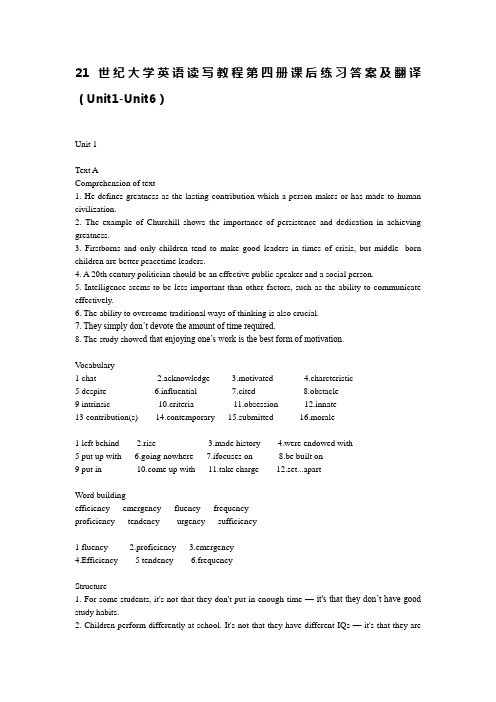
21世纪大学英语读写教程第四册课后练习答案及翻译(Unit1-Unit6)Unit 1Text AComprehension of text1. He defines greatness as the lasting contribution which a person makes or has made to human civilization.2. The example of Churchill shows the importance of persistence and dedication in achieving greatness.3. Firstborns and only children tend to make good leaders in times of crisis, but middle- born children are better peacetime leaders.4. A 20th century politician should be an effective public speaker and a social person.5. Intelligence seems to be less important than other factors, such as the ability to communicate effectively.6. The ability to overcome traditional ways of thinking is also crucial.7. They simply don‟t devote the amount of time required.8. The study showe d that enjoying one‟s work is the best form of motivation.V ocabulary1 chat 2.acknowledge 3.motivated 4.charcteristic5 despite 6.influential 7.cited 8.obstacle9 intrinsic 10.criteria 11.obsession 12.innate13 contribution(s) 14.contemporary 15.submitted 16.morale1 left behind 2.rise 3.made history 4.were endowed with5 put up with 6.going nowhere 7.ifocuses on 8.be built on9 put in e up with 11.take charge 12.set...apartWord buildingefficiency emergency fluency frequencyproficiency tendency urgency sufficiency1 fluency 2.proficiency 3.emergency4.Efficiency 5 tendency 6.frequencyStructure1. For some students, it's not that they don't put in enough time —it's that they don‟t have good study habits.2. Children perform differently at school. It's not that they have different IQs — it's that they arebrought up in different environments.3. The company is not very productive. It's not that its staff aren't talented — it's that their energy hasn't been channeled effectively.4. I‟m really sorry. It's not that I don't want to go to the cinema with you— it's that I have to finish my paper tonight.5. You have a stomachache. It's not that the food was bad — it's probably that you have too much stress from your work.1. President Wilson didn't try to bring the US back to economic and political isolation. Instead, he believed in international cooperation through an association of nations.puters don't teach students in groups. Instead, they can help them learn effectively according to their different needs.3. We shouldn't focus on minor points. Instead, we should try to solve the problem of the greatest urgency at present.4. He doesn‟t get anybody else to help him. Instead, he likes to attend to everything himself.5. Teaching success shouldn't be measured by the scores the students receive on tests. Instead, it should be measured by whether the students have internalized the ability and desire to learn. Close1-5 BCBAD6-10 DCABA11-15 DABCATransition西蒙顿说,如果事业上取得巨大成就者具有什么共性的话,那就是一种持续不断地追求成功的动力。
21世纪大学英语读写教程第四册cloze中英文对照版
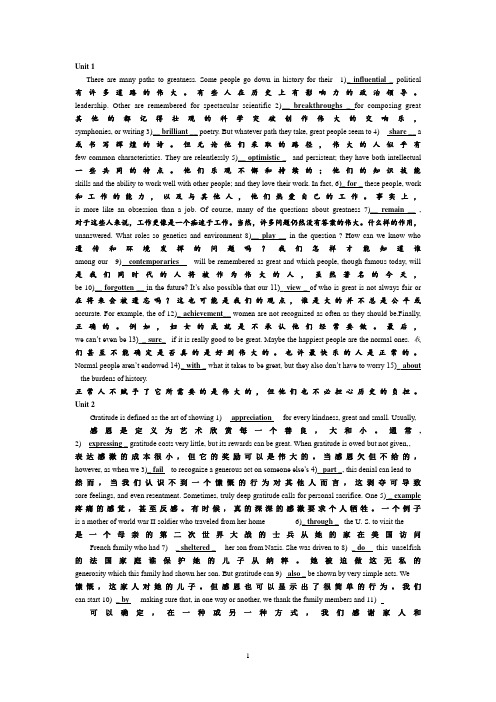
Unit 1There are many paths to greatness. Some people go down in history for their 1)_ influential _political 有许多道路的伟大。
有些人在历史上有影响力的政治领导。
leadership. Other are remembered for spectacular scientific 2)__ breakthroughs _ for composing great 其他的都记得壮观的科学突破创作伟大的交响乐,symphonies, or writing 3)__ brilliant __ poetry. But whatever path they take, great people seem to 4)__ share __ a 或书写辉煌的诗。
但无论他们采取的路径,伟大的人似乎有few common characteristics. They are relentlessly 5)__ optimistic __ and persistent; they have both intellectual 一些共同的特点。
他们乐观不懈和持续的;他们的知识技能skills and the ability to work well with other people; and they love their work. In fact, 6)_ for _ these people, work 和工作的能力,以及与其他人,他们热爱自己的工作。
事实上,is more like an obsession than a job. Of course, many of the questions about greatness 7)__ remain __, 对于这些人来说,工作更像是一个痴迷于工作。
当然,许多问题仍然没有答案的伟大。
21世纪大学英语第四册Unit6课文详析读写教程

21世纪⼤学英语第四册Unit6课⽂详析读写教程21世纪⼤学英语第四册Unit6课⽂详析(读写教程) 导语:EQ是⼀个⼈⾃我情绪管理以及管理他⼈情绪的能⼒指数,下⾯是⼀篇讲述EQ因⼦的英语课⽂,欢迎⼤家来学习。
The EQ Factor Nancy Gibbs It turns out that a scientist can see the future by watching four-year-olds interact with a marshmallow. The researcher invites the children, one by one, into a plain room and begins the gentle torment. You can have this marshmallow right now, he says. But if you wait while I run an errand, you can have two marshmallows when I get back. And then he leaves. Some children grab for the treat the minute he's out the door. Some last a few minutes before they give in. But others are determined to wait. They cover their eyes; they put their heads down; they sing to themselves; they try to play games or even fall asleep. When the researcher returns, he gives these children their hard-earned marshmallows. And then, science waits for them to grow up. By the time the children reach high school, something remarkable has happened. A survey of the children's parents and teachers found that those who as four-year-olds had enough self-control to hold out for the second marshmallow generally grew up to be better adjusted, more popular, adventurous, confident and dependable teenagers. The children who gave in to temptation early on were more likely to be lonely, easily frustrated and stubborn. They could not endure stress and shied away from challenges. And when some of the students in the two groups took the Scholastic Aptitude Test, the kids who had held out longer scored an average of 210 points higher. When we think of brilliance we see Einstein, deep-eyed, woolly haired, a thinking machine with skin and mismatched socks. High achievers, we imagine, were wired for greatness from birth. But then you have to wonder why, over time, natural talent seems to ignite in some people and dim in others. This is where the marshmallows come in. It seems that the ability to delay gratification is a master skill, a triumph of the reasoning brain over the impulsive one. It is a sign, in short, of emotional intelligence. And it doesn't show up on an IQ test. For most of this century, scientists have worshipped the hardware of the brain and the software of the mind; the messy powers of the heart were left to the poets. But cognitive theory could simply not explain the questions we wonder about most: why some people just seem to have a gift for living well; why the smartest kid in the class will probably not end up the richest; why we like some people virtually on sight and distrust others; why some people remain upbeat in the face of troubles that would sink a less resilient soul. What qualities of the mind or spirit, in short, determine who succeeds? The phrase "emotional intelligence" was coined by Yale psychologist Peter Salovey and the University of New Hampshire's John Mayer five years ago to describe qualities like understanding one's own feelings, empathy for the feelings of others and "the regulation of emotion in a way that enhances living." Their notion is about to bound into the national conversation, handily shortened to EQ, thanks to a new book, Emotional Intelligence by Daniel Goleman. Goleman, a Harvard psychology Ph.D. and a New York Times science writer with a gift for making even the most difficult scientific theories digestible to lay readers, has brought together a decade's worth of behavioral research into how the mind processes feelings. His goal, he announces on the cover, is to redefine what it means to be smart. His thesis: when it comes to predicting people's success, brainpower as measured by IQ and standardized achievement tests may actually matter less than the qualities of mind once thought of as "character" before the word began to sound old-fashioned. At first glance, there would seem to be little that's new here to any close reader of fortune cookies. There may be no less original idea than the notion that our hearts hold dominion over our heads. "I was so angry," we say, "I couldn't think straight." Neither is it surprising that "people skills" are useful, which amounts to saying, it's good to be nice. "It's so true it's trivial,"says Dr. Paul McHugh, director of psychiatry at Johns Hopkins University School of Medicine. But if it were that simple, the book would not be quite so interesting or its implications so controversial. This is no abstract investigation. Goleman is looking for antidotes to restore "civility to our streets and caring to our communal life." He sees practical applications everywhere for how companies should decide whom to hire, how couples can increase the odds that their marriages will last, how parents should raise their children and how schools should teach them. When street gangs substitute for families and schoolyard insults end in stabbings, when more than half of marriages end in divorce, when the majority of the children murdered in this country are killed by parents and stepparents, many of whom say they were trying to discipline the child for behavior like blocking the TV or crying too much, it suggests a demand for remedial emotional education. And it is here the arguments will break out. Goleman's highly popularized conclusions, says McHugh, "will chill any veteran scholar of psychotherapy and any neuroscientist who worries about how his research may come to be applied." While many researchers in this relatively new field are glad to see emotional issues finally taken seriously, they fear that a notion as handy as EQ invites misuse. Goleman admits the danger of suggesting that you can assign a numerical value to a person's character as well as his intellect; Goleman never even uses the phrase EQ in his book. But he did somewhat reluctantly approve an "unscientific" EQ test in USA Today with choices like "I am aware of even subtle feelings as I have them," and "I can sense the pulse of a group or relationship and state unspoken feelings." "You don't want to take an average of your emotional skill," argues Harvard psychology professor Jerome Kagan, a pioneer in child-development research. "That's what's wrong with the concept of intelligence for mental skills too. Some people handle anger well but can't handle fear. Some people can't take joy. So each emotion has to be viewed differently." EQ is not the opposite of IQ. Some people are blessed with a lot of both, some with little of either. What researchers have been trying to understand is how they complement each other; how one's ability to handle stress, for instance, affects the ability to concentrate and put intelligence to use. Among the ingredients for success, researchers now generally agree that IQ counts for about 20%; the rest depends on everything from class to luck to the neural pathways that have developed in the brain over millions of years of human evolution. New Words EQ (abbr.)emotional quotient 情商 interact vi. (with) act or have an effect on each other 相互作⽤;相互影响 marshmallow n. soft sweet made from sugar and gelatine 果汁软糖 torment n. severe physical or mental suffering (⾁体或精神上的)折磨,痛苦 vt. cause severe suffering to 折磨;使痛苦 errand n. small job that requires a short journey, usu. for sb. else (短程的)差事,差使 hard-earned a. gained with great difficulty or effort ⾟苦挣来的 survey n. investigation 调查 adventurous a. eager for or fond of adventure 渴望冒险的,喜欢冒险的 dependable a. that may be depended on 可信赖的,可靠的 scholastic a. of schools and education 学校的;教育的;学业的 aptitude n. natural ability or skill 天⽣的`才能或技巧;天资 brilliance n. the quality of being brilliant 光辉,辉煌;壮丽;(卓越的)才华,才智 woolly a. ⽺⽑(制)的;产⽺⽑的;像⽺⽑的 mismatch vt. match (people or things) wrongly or unsuitably 使错配,配合不当 sock n. short stocking covering the ankle and lower part of the leg 短袜 ignite v. (cause to) catch fire, burn (使)着⽕,燃烧;发光 dim v. (cause to) become dim (使)变暗淡;(使)变模糊;(使)失去光泽 impulsive a. (of people and their behavior) marked by sudden action that is undertaken without careful thought (指⼈或⼈的⾏为)凭冲动的;易冲动的 messy a. in a state of disorder; dirty: causing dirt or disorder 凌乱的;脏的;搞乱的;搞脏的 upbeat a. optimistic or cheerful 乐观的;快乐的 resilient a. 1. 有弹性的,有回弹⼒的;能复原的 2. 有复原⼒的;富有活⼒的;适应性强的 empathy n. ability to imagine and share another person's feelings, experience, etc. 同情;同感;共鸣 handily ad. 灵巧地,熟练地;轻易地;近便地 digestible a. that can be digested; relatively easy to understand 可消化的;可吸收的;较易理解的 behavioral a. of behavior ⾏为的 thesis n. 1. statement or theory put forward and supported by argument 论题,命题;论点 2. long written essay submitted by a candidate for a university degree; dissertation 毕业论⽂;学位论⽂ standardize vt. make(sth.)conform to a fixed standard, shape, quality, type, etc. 使(某事物)标准化;使合乎标准(或规格) fortune n. 1. large amount of money; wealth ⼤笔的钱;财 2. chance; luck 机会;运⽓ 3. person's destiny or future; fate 命运;前途 cookie n. biscuit 饼⼲ fortune cookie (U.S.)thin biscuit, folded to hold a printed message (e.g.a proverb, prophecy or joke) served in Chinese restaurants (美)签语饼(中国餐馆的折叠形⼩饼,内有纸条,上写预测运⽓的格⾔或幽默套语) dominion n. (over) rule; powerful authority; effective control 统治;管辖;⽀配;控制 straight ad. clearly, logically 清晰地;有条理地 controversial a. causing or likely to cause argument or disagreement 引起争论的;有争议的 abstract a. existing in thought or as an idea but not having a physical or practical existence 抽象的 antidote n. 解毒药;(喻)矫正⽅法,对抗⼿段 civility n. fact or act of showing politeness; act of being civilized 礼貌,客⽓,谦恭 communal a. 1. of or referring to a commune or a community 公共的;社区的,集体的 2. for the use of all; shared 公⽤的;共有的 odds n. (pl.) probability or chance 可能性;机会 schoolyard n. 校园;操场 stab vt. pierce(sth.) or wound (sb.) with a pointed tool or weapon; push (a knife, etc.) into sb./sth. 戳(某物);刺(某⼈);⽤(⼑等)刺(或戳、捅)某⼈(或某物) stabbing n. instance of stabbing or being stabbed ⽤利器伤⼈ stepparent n. 继⽗,后⽗;继母,后母 remedy n. 药品;治疗(法);补救办法;纠正办法 vt. 医治;治疗;补救;纠正 remedial a. 补救的;纠正的;补习的 popularize vt. 1. make (sth.) generally liked 使(某事物)被⼤家喜欢,使受⼤家欢迎 2. make (sth.) known or available to the general public, esp. by presenting it in an easily understandable form 使(某事物)众所周知;使普及 chill vt. 1. make cold 使变冷;使冷却;使感到冷 2. discourage 使沮丧;使扫兴 n. 寒冷;风寒;冷淡;沮丧;扫兴 scholar n. person who studies an academic subject deeply 学者 psychotherapy n. treatment of mental disorders by psychological methods 精神疗法;⼼理疗法 neuroscientist n. 神经系统科学家 handy a. (of an object, tool, machine, etc.) easy to use; useful for some purpose 便于使⽤的;有⽤的 numerical a. of, expressed in or representing numbers 数字的;⽤数字表⽰的;代表数字的 approve vt. 1. have a positive opinion of 赞成;称许 2. accept, permit or officially agree to 批准;允许;对…表⽰认可 neural a. the nerves 神经的 pathway n. way or track made for or by people walking ⼩路,⼩径(= path) Phrases and Expressions one by one separately; individually in order ⼀个⼀个地;依次地 right now immediately; at this moment ⽴即;此刻 run an errand carry messages or perform similar minor tasks 跑腿,办事(如送信、买东西等) hold out refuse to give in 坚持;坚定不移;不屈服 early on soon after the start of a past event 在初期;早先 shy away from avoid or move away from out of shyness, fear, etc. (由于羞怯或恐惧等)躲开,避开;回避 over time as time goes by 随着时间过去 come in have a part to play in sth. 在某事中起作⽤ show up 1. become visible; become increasingly vivid or obvious 显现出来;变得更鲜明;变得更醒⽬ 2. appear; arrive; be present; turn up 出现;来到;出席;露⾯ at/on sight as soon as sb./sth. is seen ⼀见就 in the face of 1. in spite of 不顾。
21世纪大学英语读写教程第四册第6课
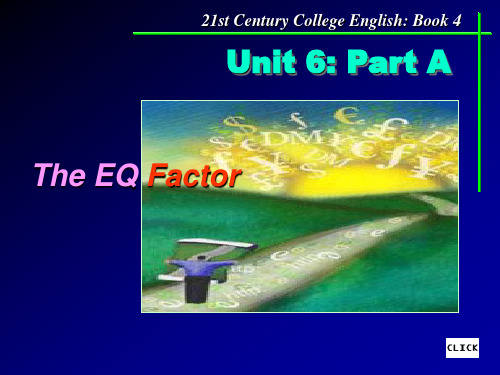
Unit 6: Part A
The EQ Factor
Unit 6: Part A
• Pre-Reading Activities • Text A: Language Points • Exercises • Assignment
Pre-Reading Activities
3. Which of the following statements best describes the relationship between EQ and IQ? A) People tend to have more of one than the other. B) People tend to have the same amount of each. C) They work together to make you successful. D) They depend on such factors as social class and how lucky you are.
3 By the time the children reach high school, something remarkable has happened. A survey of the children's parents and teachers found that those who as four-year-olds had enough self-control to hold out for the second marshmallow generally grew up to be better adjusted, more popular, adventurous, confident and dependable teenagers.
21世纪大学英语(读写教程)第四册课文全翻译
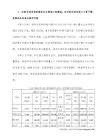
如何变得有天赋朱利叶斯·法斯特芭芭拉·法斯特在一项对教育方法的研究中,一位教师被告知她的新班中全是有非凡天赋的孩子。“你应该从他们那儿获得高于平均水平的成绩,”有人这样通知她,而到了期末她所得到的正是这个——超出平均水平的成绩。这件事的引人注目之处在于事实上这个班的学生并非异乎寻常。他们只是一群中等水平的、智商处于正常范围之内的学生。这位老师被告知的并不是他们真实的潜力。这项研究揭示了许多关于教学和孩子问题的许多答案,但它留下的未回答的问题更多。但它的确非常清晰地表明了一点,即当一个孩子相信老师的期望是真诚的时候,他通常是不会辜负这种期望的。一个没有回答的问题是:那位老师是以什么方式向学生们表明他们是特殊的,能取得优异成绩的呢?她没有用许多话告诉他们这一点,但显然在她的态度中有某种东西使学生们确信他们是有非凡天赋的。进一步的研究表明,老师态度中那种特别的“东西”,一部分是她给全班布置的作业,一部分是她布置作业的方式。但最强有力的“东西”还是老师本人和她对全班学生及其能力的态度。当她说“你们是聪明的孩子”时,她的声音中有更多的信心和关注。一直有一种鼓励性的语气在告诉他们他们会取得进步,很大的进步。孩子们收到了这些信号,并对它们作出了积极的反应。某个学生的成绩达不到老师的期望是常有的事。当这种情况发生时,那个学生面对的不是失望、愤怒或恼怒。相反,老师认为这是一次例外,一件偶然的事情,倒霉的一天,一次暂时的失误——而学生相信了她,并消除了疑虑。下一次,他更加努力了,决心做到老师知道他能做到的事。很难精确地确定老师传达的信息:“我期待着最好的成绩,”中到底是哪一部分告诉了孩子。它的一部分包括显示信心的平和语调,言语上的耐心,及没有讽刺、贬低和恼怒等消极因素。期待着最好成绩的老师满怀信心地提问,因为她知道她得到的答案将是正确的,而孩子也感受到了那种信心。这一信息大多是通过声音传递的,但也有相当惊人的一部分表现在态度、接触和面部表情上。跟这个对“天才”儿童所做的实验相类似的实验也在“天才”老鼠的身上做了。一位科学家得到的是一群普通的老鼠,但却被告知它们是一个特殊的品种,曾接受过在创记录的时间里穿越迷宫的训练。在与这些老鼠一起工作时,这位科学家发现它们确实比其他老鼠学得快,穿越迷宫也的确更迅速。但是老鼠对我们的语言一无所知。那位科学家是怎样得以将他的期望传达给它们的呢?对实验中所有变量的检查表明,这些异常好的结果应归功于他对待老鼠的方式,他对它们讲话的方式和语调,他声音中的信心、安抚和确定无疑。老鼠理解了所有的信息,并照着做了。从更广泛的角度看这两个实验,那位老师和那位科学家都运用了一个对所有社会各个阶层的人都通用的原则——贴标签原则。我们所有的期待都带有偏见,我们对于不同的人有着完全不同的期望,甚至对各个民族也是如此。我们依据民族特点来判断人。我们认为美国人贪婪,想赚大钱,我们在心里给他们贴上了这样的标签。我们给德国人贴的标签是整洁而有条理,英国人是冷漠、不友好和矝持寡言,意大利人是易动感情,日本人彬彬有礼——等等等等。我们在一个非常宽阔的、远非同质的群体上贴了一张非常狭小的标签。我们在种族层面上也是这样。黑人有音乐感,印第安人坚忍,东方人神秘莫测。我们甚至给性别贴上标签——男人积极进取、女人消极被动。在家庭层面上,标签有时是由邻居们贴上的。“琼斯一家都是废物……总是依靠救济。”有时标签也许是由那家人自己贴的。“我们史密斯一家宁愿挨饿也不会请求政府帮助!”史密斯家的男孩因带着这个令人敬畏的独立标签长大,很容易与自己的标签名实相符,正如琼斯家的女孩很容易与她的标签名实相符一样:“他们都认为我们是废物?那我就表现得像废物!”这种标签也许不太全面,甚至带有性别歧视。某个家庭也许会自豪地说,“我们家的男人一直都是专业人员。”当这个家庭里的一个儿子比尔发现木工活是他最喜爱的工作时,他便面对着同家庭的冲突——以及同自己的冲突。他内心的力量也许能使他按照自己的意愿坚持到底,成为一个木匠,但另一方面他也知道他没有符合家庭的标签,因此他怀着一种负罪感度过一生。他甚至可能给自己创造标签。“我是一个失败者,真的。”即使比尔在自己这一行里是个成功者,经过一段时间以后拥有了自己的企业,比他当律师的兄弟鲍勃赚的钱还多,那也没用。比尔仍然不是一个专业人员,因此他内心的标签上仍然写着失败。在家庭内部贴标签很早便开始了。在宝宝听得懂口头语言之前,他便能对肢体语言和间接交流作出反应了。他在懂得词语之前,已经从父母的声音中感受到爱,他也感受到嫌弃、冷淡、恐惧或敌意,他也对这些情绪作出了反应。如果他得到的是爱和温柔,他也以爱和温柔作出反应。以后,当他理解言语时,他便接受他的标签。吉米是家里的乖孩子,而一向难弄的莎莉则得到了惹是生非者的标签。每个孩子除了名字外还得到一个标签。她是聪明的。他爱出风头。诺曼老是迟到。贝蒂不招人爱。芭芭拉很冷漠。杰克很野。纳塔莉很甜,等等等等。这些标签也许反映了事实。纳塔莉也许很甜,但往往是标签把现实强加于孩子身上。如果纳塔莉经常听到别人说她很甜,她便开始表现得很甜。你往往会使自己与你的标签名实相符。同样,参加教学实验的学生们被加上了聪明的标签,于是他们便设法变得聪明,超常地发挥了他们的许多当面或在电视上听我讲话的人,或者那些读到我讲话的人都以为我的学历远远不止八年级。这一印象完全归功于我在监狱中的学习。这是在查尔斯顿监狱真正开始的,当时宾比第一次让我对他渊博的知识感到了羡慕。无论参与什么交谈,宾比总是起着主导作用,而我也曾经试图效仿他。但我找到的每本书中,几乎每句句子都有一个以上甚至几乎全部的单词我压根儿不认识。当我跳过那些词时,我最终当然不知道书中所云。所以我来到诺福克监狱时,仍然只有看看书的意愿。要不是我后来获得了动力,我本来很快就会连这些愿望也丢弃的。我明白我最好是能弄到一本字典——为的是学习,学一些单词。幸好我还想到应该努力提高一下自己的书写水平。我的书写很糟糕,甚至于不能将字写在一条直线上。这两个想法促使我要求诺福克监狱学校给我一本字典以及一些便笺簿和铅笔。头两天我还拿不定主意,只是随便翻了翻字典。我从来没有意识到会有这么多单词!我不知道哪些词是我需要学习的。最后,为了开始某种行动,我便开始了抄写。我把印在第一页上的所有东西甚至标点符号,慢慢地、费力地、歪歪斜斜地抄到了我的便笺簿里。我记得那花了我一天的时间。然后,我便把写在便笺簿上的每个词大声读给自己听。我一遍又一遍地把自己写的东西大声读给自己听。第二天早上醒来时我还想着那些词——我无比自豪地意识到,我不仅一下子写了那么多,还写了许多我从来不知道存在于这个世界上的词。而且,我稍微动一下脑筋还能记得其中许多词的意思。我复习了那些被我忘记了意思的单词。有趣的是,就在此刻,词典第一页上的“土豚”一词竟跳入了我的脑海之中。字典上有它的一幅插图,一种长尾、长耳、会挖洞的非洲哺乳动物,以白蚁为食,像食蚁动物捕食蚂蚁那样伸出舌头来捕食白蚁。我完全被迷住了,于是又继续干下去——我抄写了字典的下一页。当我学习它时我获得了同样的体验。随着以后的每一页,我还了解了人物、地方和历史事件。实际上字典就像一部小型百科全书。最后,字典的A部分抄满了一整本便笺簿——于是我便继续抄写B部分。我就这样开始抄写了整本字典。如此多的实践帮我提高了书写速度,所以以后我抄得快多了。包括我写在便笺簿上的词和写的信,我猜我在后来的囚禁日子里足足写下了一百万词。我认为随着词汇量的增加,我肯定能第一次拿起一本书来读并开始理解书中讲的内容了。任何一个博览群书的人都能想象得出那个被打开的新世界。让我告诉你一些事;从那以后直到我离开那所监狱,在我的每一段空闲时间里,我不是在图书馆里看书,就是在我的床上看书。你哪怕用楔子也休想把我跟书分开。我学习穆罕默德先生的教导,我跟别人通信,我会客,我读书,日子就这样一个月一个月地过去了,我甚至没有想到自己是在坐牢。事实上,在那之前,我在生活中从来没有那样真正自由过……正如你能想象的,尤其在一个特别强调改造的监狱里,如果一个犯人表现出对书籍异乎寻常的强烈兴趣,他就会受到赞许。犯人中有相当多的博览群书者,尤其是受广欢迎的辩论家。一些人被公认为活的百科全书。他们几乎成了名人。当这个新世界,这个能够阅读并理解的新世界向我敞开时,我贪婪地阅读文学作品,数量之多超过了任何一所大学对任何一个学生的要求。我在自己的房间里比在图书馆里读得更多。一个以读书多而出名的犯人能超出规定借出更多的书。我更喜欢在与外界完全隔绝的自己的房间里读书。当我发展到开始读非常严肃的读物时,每天晚上10点左右,我会因为“熄灯”而愤怒不已。它似乎总是在我正读到引人入胜之处时来跟我捣乱。幸好在我的门外面有一盏走廊灯把光线照到我的房间里。一旦我的眼睛适应之后,这点光线就足以让我读书。所以“熄灯”后,我就坐在地板上,借着那点光继续读书。夜间看守每隔一小时就走过每个房间。每次听到越来越近的脚步声,我就跳到床上假装睡觉。看守一走过去,我就从床上回到地板上那块亮的地方,再读上58分钟——直到看守再次走过来。这样一直持续到每天凌晨三四点钟。每天晚上睡三四个小时对我来说就足够了。在流落街头的那些日子里我经常睡得更少。我经常思考阅读为我打开的那些新的远景。我当时在狱中就知道,阅读已永远改变了我的人生历程。正如我现在所认识到的,阅读能力唤醒了在我内心潜伏已久的对于思想活跃的渴望。我当然不是在追求任何学位,那只是大学授予学生一种地位象征的方式。我通过自学所受到的教育使我每读一本新书就更意识到正在折磨着美国黑色人种的聋、哑和盲。不久前,一位英国作家从伦敦打来电话问了我几个问题。其中一个问题是,“你的母校是哪儿?”我告诉他,“是书。”在任何一个空闲的十五分钟里,你都会发现我在学习一些我觉得可能有助于黑人的东西……每次乘飞机,我都带一本想读的书——至今已读了很多书。如果我现在不是每天出来同白人斗争,我会将余生用于阅读,仅仅是为了满足我的好奇心——因为你几乎说不出什么东西是我不感到好奇的。 我想任何人都没有像我那样从坐牢中获得了那么多。事实上,如果我的生活是另一个样子,如果我上了大学,我就不能像在监狱里那样能更集中地进行学习。我想上大学最大的麻烦之一就是有太多让人分心的事。除了监狱还有什么地方能让我有时候每天集中学习15个小时来克服我的愚昧无知呢?
21世纪大学英语读写教程第四册答案解析与课文翻译
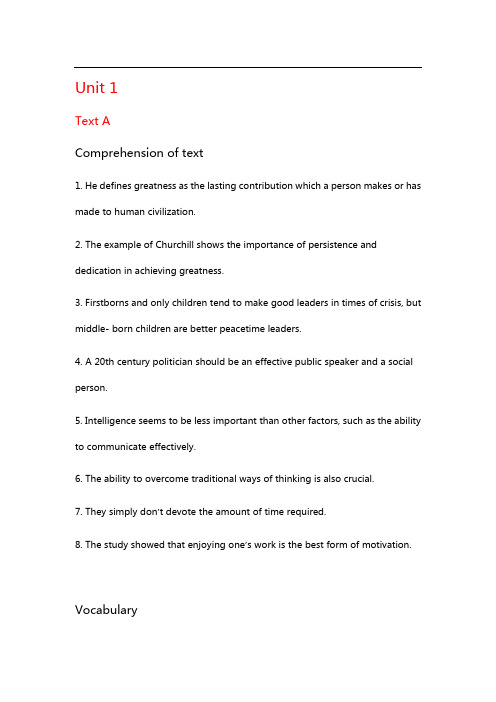
Unit 1Text AComprehension of text1. He defines greatness as the lasting contribution which a person makes or has made to human civilization.2. The example of Churchill shows the importance of persistence and dedication in achieving greatness.3. Firstborns and only children tend to make good leaders in times of crisis, but middle- born children are better peacetime leaders.4. A 20th century politician should be an effective public speaker and a social person.5. Intelligence seems to be less important than other factors, such as the ability to communicate effectively.6. The ability to overcome traditional ways of thinking is also crucial.7. They simply don’t devote the amount of time required.8. The study showed that enjoying one’s work is the best form of motivation. Vocabulary1 chat 2.acknowledge 3.motivated 4.charcteristic 5 despite 6.influential 7.cited 8.obstacle9 intrinsic 10.criteria 11.obsession 12.innate13 contribution(s) 14.contemporary 15.submitted 16.morale1 left behind 2.rise 3.made history 4.were endowed with 5 put up with 6.going nowhere 7.ifocuses on 8.be built on9 put in e up with 11.take charge 12.set...apartWord buildingefficiency emergency fluency frequencyproficiency tendency urgency sufficiency1 fluency 2.proficiency 3.emergency4.Efficiency 5 tendency 6.frequencyStructure1. For some students, it's not that they don't put in enough time — it's that they don’t have good study habits.2. Children perform differently at school. It's not that they have different IQs —it's that they are brought up in different environments.3. The company is not very productive. It's not that its staff aren't talented — it's that their energy hasn't been channeled effectively.4. I’m really sorry. It's not that I don't want to go to the cinema with you— it's that I have to finish my paper tonight.5. You have a stomachache. It's not that the food was bad — it's probably that you have too much stress from your work.1. President Wilson didn't try to bring the US back to economic and political isolation. Instead, he believed in international cooperation through an association of nations.puters don't teach students in groups. Instead, they can help them learn effectively according to their different needs.3. We shouldn't focus on minor points. Instead, we should try to solve the problem of the greatest urgency at present.4. He doesn’t get anybody else to help him. Instead, he likes to attend to everything himself.5. Teaching success shouldn't be measured by the scores the students receive on tests. Instead, it should be measured by whether the students have internalized the ability and desire to learn.Close1-5 BCBAD6-10 DCABA11-15 DABCATransition西蒙顿说,如果事业上取得巨大成就者具有什么共性的话,那就是一种持续不断地追求成功的动力。
21世纪大学英语读写教程第四册课文翻译及课后习题的翻译-fd13
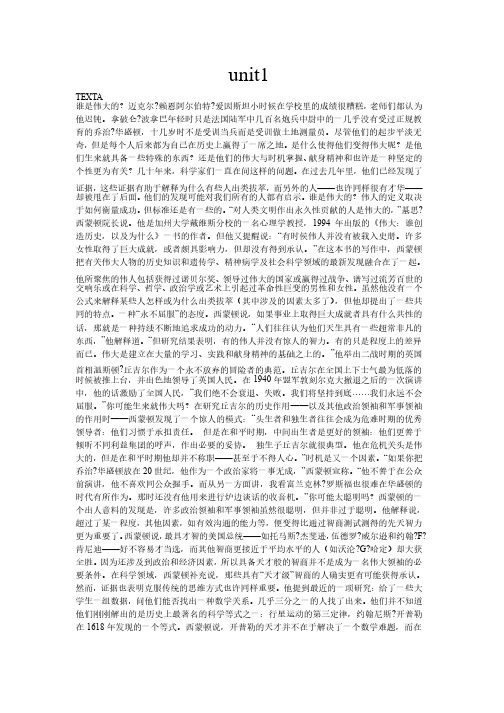
unit1 TEXTA 谁是伟大的?迈克尔?赖恩阿尔伯特?爱因斯坦小时候在学校里的成绩很糟糕,老师们都认为他迟钝。
拿破仑波拿巴年轻时只是法国陆军中几百名炮兵中尉中的一几乎没有受过正规教育的乔治华盛顿,十几岁时不是受训当兵而是受训做土地测量员。
尽管他们的起步平淡无奇,但是每个人后来都为自己在历史上赢得了一席之地。
是什么使得他们变得伟大呢?是他们生来就具备一些特殊的东西?还是他们的伟大与时机掌握、献身精神和也许是一种坚定的个性更为有关?几十年来,个性更为有关?几十年来,科学家们一直在问这样的问题。
科学家们一直在问这样的问题。
科学家们一直在问这样的问题。
在过去几年里,在过去几年里,他们已经发现了证据,这些证据有助于解释为什么有些人出类拔萃,而另外的人——也许同样很有才华——却被甩在了后面。
他们的发现可能对我们所有的人都有启示。
谁是伟大的?伟人的定义取决于如何衡量成功。
但标准还是有一些的。
“对人类文明作出永久性贡献的人是伟大的,”基思?西蒙顿院长说。
他是加州大学戴维斯分校的一名心理学教授,1994年出版的《伟大:谁创造历史,以及为什么》一书的作者。
但他又提醒说:“有时侯伟人并没有被载入史册。
许多女性取得了巨大成就,或者颇具影响力,但却没有得到承认。
”在这本书的写作中,西蒙顿把有关伟大人物的历史知识和遗传学、精神病学及社会科学领域的最新发现融合在了一起。
他所聚焦的伟人包括获得过诺贝尔奖、领导过伟大的国家或赢得过战争、谱写过流芳百世的交响乐或在科学、交响乐或在科学、哲学、哲学、政治学或艺术上引起过革命性巨变的男性和女性。
政治学或艺术上引起过革命性巨变的男性和女性。
虽然他没有一个虽然他没有一个公式来解释某些人怎样或为什么出类拔萃(其中涉及的因素太多了),但他却提出了一些共同的特点。
同的特点。
一种一种“永不屈服”的态度。
西蒙顿说,的态度。
西蒙顿说,如果事业上取得巨大成就者具有什么共性的如果事业上取得巨大成就者具有什么共性的话,那就是一种持续不断地追求成功的动力。
21世纪大学英语读写教程第四册答案及课文翻译
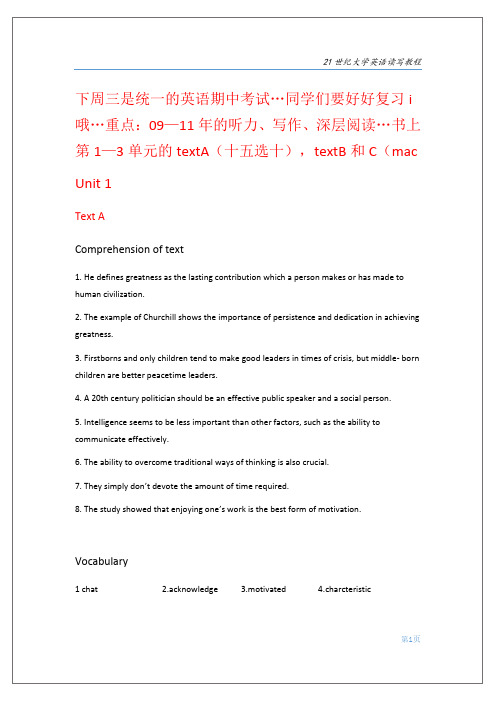
11 analysis12 rally13 determined14 consoled
Error correction
1 awardsrewards 2 they it3 do done
4decrease increased 5 rises falls 6strict strictly
7 People continuously work People who continuously work
1. PresidentWilson didn't try to bring theUSback to economic and political isolation. Instead, he believed in international cooperation through an association of nations.
5. Afterhe took charge, we discovered that there were striking differences between him and his predecessor. He had the drive and passion, came up with many new ideas, and focused his work on how to raise our morale.
2. Hisuncoபைடு நூலகம்promising personality explains why he could no longer put up with his employer and eventuallysubmitted hisresignation.
21世纪大学实用英语综合教程4课文翻译
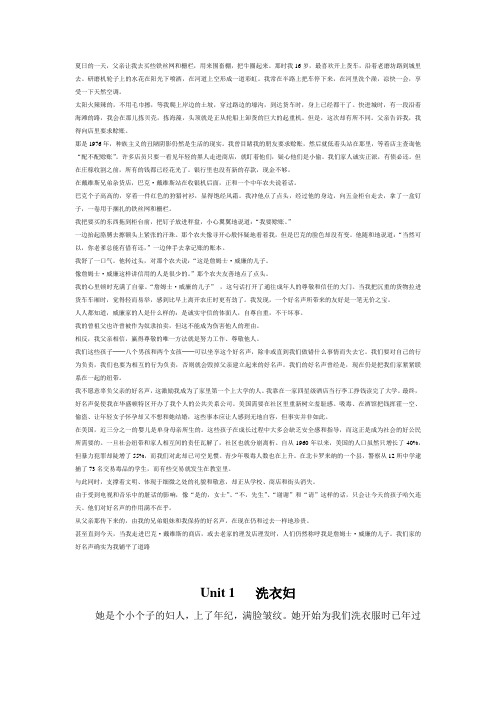
夏日的一天,父亲让我去买些铁丝网和栅栏,用来围畜棚,把牛圈起来。
那时我16岁,最喜欢开上货车,沿着老磨坊路到城里去。
研磨机轮子上的水花在阳光下喷洒,在河道上空形成一道彩虹。
我常在半路上把车停下来,在河里洗个澡,凉快一会,享受一下天然空调。
太阳火辣辣的,不用毛巾擦,等我爬上岸边的土坡,穿过路边的壕沟,到达货车时,身上已经都干了。
快进城时,有一段沿着海滩的路,我会在那儿拣贝壳,拣海藻,头顶就是正从轮船上卸货的巨大的起重机。
但是,这次却有所不同。
父亲告诉我,我得向店里要求赊账。
那是1976年,种族主义的丑陋阴影仍然是生活的现实。
我曾目睹我的朋友要求赊账,然后就低着头站在那里,等着店主查询他“配不配赊账”。
许多店员只要一看见年轻的黑人走进商店,就盯着他们,疑心他们是小偷。
我们家人诚实正派,有债必还。
但在庄稼收割之前,所有的钱都已经花光了。
银行里也没有新的存款,现金不够。
在戴维斯兄弟杂货店,巴克·戴维斯站在收银机后面,正和一个中年农夫说着话。
巴克个子高高的,穿着一件红色的狩猎衬衫,显得饱经风霜。
我冲他点了点头,经过他的身边,向五金柜台走去,拿了一盒钉子,一卷用于捆扎的铁丝网和栅栏。
我把要买的东西拖到柜台前,把钉子放进秤盘,小心翼翼地说道:“我要赊账。
”一边抬起胳膊去擦额头上紧张的汗珠。
那个农夫像寻开心般怀疑地看着我,但是巴克的脸色却没有变。
他随和地说道:“当然可以,你老爹总能有借有还,”一边伸手去拿记账的账本。
我舒了一口气。
他转过头,对那个农夫说:“这是詹姆士·威廉的儿子。
像詹姆士·威廉这样讲信用的人是很少的。
”那个农夫友善地点了点头。
我的心里顿时充满了自豪。
“詹姆士·威廉的儿子”,这句话打开了通往成年人的尊敬和信任的大门。
当我把沉重的货物拉进货车车厢时,觉得轻而易举,感到比早上离开农庄时更有劲了。
我发现,一个好名声所带来的友好是一笔无价之宝。
人人都知道,威廉家的人是什么样的:是诚实守信的体面人,自尊自重,不干坏事。
新21世纪大学英语综合教程4 Unit6 textB翻译

玻璃——捕捉光晕的舞步威廉·埃利斯长期以来,玻璃以其各种形式高尚地为人类服务。
作为使用最为广泛、性能最多样化的人工制造材料,玻璃既可以用来制作如网球场般大的望远镜的镜面,也可以制作又小又简单在地上滚动的弹珠。
新技术进一步拓展了这种极具可塑性的材料的用途。
长度超过800万英里的玻璃光纤把电话和电视信号传递到五湖四海,玻璃陶瓷可以用来制作导弹的鼻锥体和牙齿的人造冠,玻璃微珠可以对人体的特定器官进行靶向放射治疗,甚至还可以为了清除核废料而把它加工成一种新型的玻璃。
光学计算机即将问世,其工作原理是通过光子(即小型激光发射的脉冲)而不是通过电子来储存程序、处理信息。
脉冲通过玻璃纤维而不是通过铜丝传递。
光学计算机的运行速度将比如今的电子计算机提高几百倍,储存的信息量也大大增加。
如今,由于纤维光学技术的运用,我们能够观察到的物体越来越细微,甚至细菌病毒的内部结构也能一览无遗,所看到的图像也越来越清晰。
新一代的光学仪器已经出现,可以详尽地呈现细胞内部的运动。
正是纤维光学和液晶显示技术的大量运用,已经拥有15万名员工、总产值达160亿美元的美国玻璃工业不得不新建工厂增加产量以满足市场的需求。
然而,玻璃不仅在技术和商业领域拓宽了用途,起源于古罗马时代的传统—玻璃艺术也繁荣起来。
几乎到处可见人们在吹制玻璃工艺品。
“1975年之前我没有卖掉过一件玻璃制品,”戴尔·奇休利微笑着说。
然而,经历了低潮期之后,18年前玻璃艺术再现辉煌,如今奇休利成了20世纪最为成功的商业艺术家之一。
现在,他又接到了一宗新的活儿,为一家比萨饼公司的总部制作一个玻璃雕塑,这个任务将为他带来50万美元的酬劳。
然而,并不是所有与我们生活相关的玻璃技术都是超现代的。
以简单的灯泡为例,在本世纪初,大多数灯泡都是人工吹出来的,一个灯泡的成本相当于一个普通工人半天的报酬。
事实上,20世纪20年代康宁公司发明的带式玻璃成型机照亮了全美国,使得灯泡的价格大幅下降。
21世纪大学英语读写教程(四)Reading_aloud及其翻译(1-7)

Unit 1If great achievers share anything, said Simonton, it is an unrelenting drive to succeed. “There's a tendency to think that they are endowed with something super-normal,” he explained. “But what comes out of the research is that there are great people who have no amazing intellectual processes. It's a difference in degree. Greatness is built upon tremendous amounts of study, practice and devotion.He cited Winston Churchill, Britain's prime minister during World War 2, as an example of a risk-taker who would never give up. Thrust into office when his country's morale was at its lowest, Churchill rose brilliantly to lead the British people. In a speech following the Allied evacuation at Dunkirk in 1940, he inspired the nation when he said, “We shall not flag or fail. We shall go on to the end... We shall never surrender.”西蒙顿说,如果成就巨大者具有什么共性的话,那就是一种坚持不懈地追求成功的动力。
- 1、下载文档前请自行甄别文档内容的完整性,平台不提供额外的编辑、内容补充、找答案等附加服务。
- 2、"仅部分预览"的文档,不可在线预览部分如存在完整性等问题,可反馈申请退款(可完整预览的文档不适用该条件!)。
- 3、如文档侵犯您的权益,请联系客服反馈,我们会尽快为您处理(人工客服工作时间:9:00-18:30)。
21世纪大学英语读写教程复习资料Unit61.人们发现科学家能通过观察四岁孩童对一粒果汁软糖的反应看到他们的未来。
研究者请孩子们一个个地走进一间没有装饰的房间,然后便开始他这种温柔的折磨。
你现在就可以吃这粒果汁软糖,他说。
但是如果你在我出去办点事的时候等着,就可以在我回来时得到两粒果汁软糖。
然后他就走开了。
It turns out that a scientist can see the future by watching four-year-olds interact with a marshmallow. The researcher invites the children, one by one, into a plain room and begins the gentle torment. You can have this marshmallow right now, he says. But if you wait while I run an errand, you can have two marshmallows when I get back. And then he leaves.2.有几个孩子一等他出门就抓起糖来吃。
有几个等了几分钟,结果也坚持不住了。
但另外几个孩子却决心等待。
他们蒙住眼睛;他们低下头;他们给自己唱歌;他们试图玩游戏甚至睡觉。
当研究者回来时,他给了这些孩子来之不易的果汁软糖。
然后,科学便等待他们长大。
Some children grab for the treat the minute he's out the door. Some last a few minutes before they give in. But others are determined to wait. They cover their eyes; they put their heads down; they sing to themselves; they try to play games or even fall asleep. When the researcher returns, he gives these children their hard-earned marshmallows. And then, science waits for them to grow up.3.等孩子们读到高中时,一些引人注目的情况发生了。
对孩子们的家长和老师的调查表明,那些在四岁时就有足够的自制力坚持等到第二粒果汁软糖的孩子,长大后大多成了适应性更强,更惹人喜爱,富于冒险精神,充满自信并可信赖的青少年。
那些一开始就经不住诱惑的孩子们则更可能孤独、容易受挫、固执。
他们承受不住压力,躲避挑战。
当这两组中的一些学生参加学习能力倾向测验时,坚持时间较长的孩子们平均得分高出210分。
By the time the children reach high school, something remarkable has happened. A survey of the children's parents and teachers found that those who as four-year-olds had enough self-control to hold out for the second marshmallow generally grew up to be better adjusted, more popular, adventurous, confident and dependable teenagers. The children who gave in to temptation early on were more likely to be lonely, easily frustrated and stubborn. They could not endure stress and shied away from challenges. And when some of the students in the two groups took the Scholastic Aptitude Test, the kids who had held out longer scored an average of 210 points higher.4.当我们想到卓越的才华时,我们便想到了爱因斯坦,深邃的眼睛,蓬松的头发,一台裹着皮肤、穿着不配对短袜的思维机器。
在我们的想象中,事业上取得巨大成功者在出生时就为伟大作好了准备。
但随后你就不得不奇怪,为什么过了一段时间以后天赋似乎在一些人身上大放异彩,而在其他人身上则黯淡失色。
这就是果汁软糖的作用了。
推迟满足欲望的能力看来是一种十分重要的技能,是理智对于冲动的胜利。
总之,它是情感智力的一种标志,在智商测试中是显示不出的。
When we think of brilliance we see Einstein, deep-eyed, woolly haired, a thinking machine with skin and mismatched socks. High achievers, we imagine, were wired for greatness from birth. But then you have to wonder why, over time, natural talent seems to ignite in some people and dim in others. This iswhere the marshmallows come in. It seems that the ability to delay gratification is a master skill, a triumph of the reasoning brain over the impulsive one. It is a sign, in short, of emotional intelligence. And it doesn't show up on an IQ test. 5.在本世纪的很长一段时期里,科学家们都敬重大脑这一硬件和思想这一软件;而千头万绪的心的力量则留给了诗人。
但认知理论却怎么也无法解释我们最感到疑惑的问题:为什么有一些人似乎天生就有过好日子的能力;为什么班上最聪明的孩子很可能最终并不是最富有的;为什么我们一见到某些人就喜欢而对另外一些人则不信任;为什么面对苦难时,适应力差一些的人会被压垮,而有些人则能保持乐观。
总之,是思想或心灵中的什么品质决定了谁会成功?For most of this century, scientists have worshipped the hardware of the brain and the software of the mind; the messy powers of the heart were left to the poets. But cognitive theory could simply not explain the questions we wonder about most: why some people just seem to have a gift for living well; why the smartest kid in the class will probably not end up the richest; why we like some people virtually on sight and distrust others; why some people remain upbeat in the face of troubles that would sink a less resilient soul. What qualities of the mind or spirit, in short, determine who succeeds?6.“情感智力”这个词语是耶鲁大学心理学家彼得-萨洛韦和新罕布什尔大学的约翰-迈耶五年前为了描述某些品质——如了解自己的感情,善解人意和“以提高生活质量的方式调节情绪”——而创造出来的。
由于丹尼尔?戈尔曼的一本新书《情感智力》,他们的这一概念(缩略为情商)即将成为全国的热门话题。
戈尔曼是哈佛大学的心理学哲学博士,《纽约时报》的科学栏目撰稿人。
他具有一种使最为难懂的科学理论为一般读者理解的天赋。
他把十年来的行为研究归纳为头脑如何处理感情。
他在书的封面上宣称,他的目标是重新定义聪明的含义。
他的论点是:在预测人们的成功时,由智商和标准化成绩考试测得的智能也许不如以前被认为是“性格”(后来这个词变得过时了)的思想素质重要。
The phrase "emotional intelligence" was coined by Yale psychologist Peter Salovey and the University of New Hampshire's John Mayer five years ago to describe qualities like understanding one's own feelings, empathy for the feelings of others and "the regulation of emotion in a way that enhances living." Their notion is about to bound into the national conversation, handily shortened to EQ, thanks to a new book, Emotional Intelligence by Daniel Goleman. Goleman, a Harvard psychology Ph.D. and a New York Times science writer with a gift for making even the most difficult scientific theories digestible to lay readers, has brought together a decade's worth of behavioral research into how the mind processes feelings. His goal, he announces on the cover, is to redefine what it means to be smart. His thesis: when it comes to predicting people's success, brainpower as measured by IQ and standardized achievement tests may actually matter less than the qualities of mind once thought of as "character" before the word began to sound old-fashioned.7.乍一看,这对于任何一位仔细读签语饼中纸条的人来说似乎没有什么新的东西。
